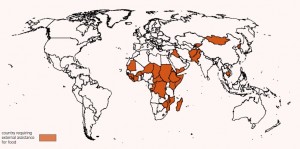According to the European Union (EU), the Sahel region of Africa could suffer a localized food crisis next year. From an article in the Guardian:
Africa’s Sahel region faces a severe food shortage next year because of erratic rainfall and localised dry spells, the EU commissioner for humanitarian aid crisis response has warned.
Kristalina Georgieva said investing in the Sahel now was not just the ethically and morally right thing to do, but would be less expensive than waiting for disaster to strike, as was the case in Somalia.
Seven million people are already facing shortages in Niger, Chad, Mali, Mauritania, Nigeria and Burkina Faso, with major shortfalls in food production in many areas. The figures point to a massive problem of food availability next year, according to the European commission.
The article then goes on to discuss how now is the time to act if we are to prevent a food crisis in the Sahel. This is especially true if aid takes the form of food aid, given how it for food aid to get to where it is going.
Here is a map culled from the FAO’s December 2011 Crop Prospects and Food Situation (link opens a .pdf). The countries in red are those most in need of food assistance. It indeed looks like the need for food assistance is concentrated around the Sahel and parts of Central Africa.

“Vous êtes pas tannés de mourir, bande de caves?”*
When I started blogging at the end of 2010, I swore never to discuss Québec politics in this space, first and foremost because my expertise lies in development policy, but also because my opinions about Québec politics, society, and culture are not shared by many.
I thus thought I would spare myself being called a sellout — not only do I live and work in the US, I also write in English, two things that are often viewed with suspicion in Québec — and keep my political opinions to myself.
Earlier this week, however, Jérôme Lussier wrote a column titled “Doléances pour un Québec dépassé” (“Complaints for an outdated Québec”) in Voir, a Montreal-based independent weekly, and every single thing he wrote deserves to be said, repeated, and broadcast far and wide. Lussier’s column is a deeply humanistic cri du coeur.
Because it’s the holidays, I am in a giving mood. So here is my bit of agitprop for the year: my translation of Lussier’s column. Bear in mind that the following is the intellectual property of Lussier.